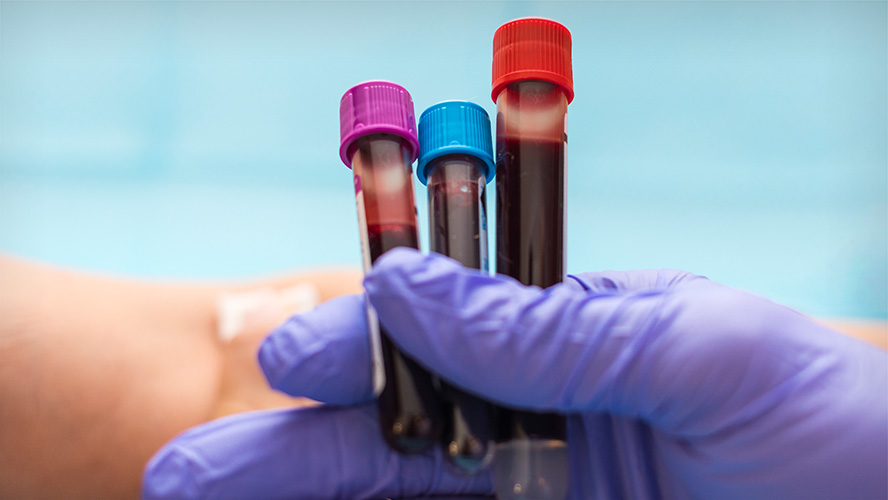
A new study from UHN’s Schroeder Arthritis Institute identified a potential biomarker—a measurable substance in blood that signals disease—for ulcerative colitis in patients with axial spondyloarthritis (AxSpA). This is a type of inflammatory arthritis that can cause chronic back pain in young adults. These findings may help make ulcerative colitis diagnosis easier and less invasive for people with AxSpA.
Research has shown that AxSpA and Inflammatory bowel disease (IBD) are closely linked. IBD is a group of conditions that cause swelling and inflammation in the digestive tract. Up to 10% of people with this form of arthritis also have IBD, and both conditions share genetic risk factors and immune connections between the gut and joints. Ulcerative colitis is a type of IBD that causes inflammation and ulcers in the colon.
While there is no cure for AxSpA or ulcerative colitis, treatment can manage symptoms and improve quality of life. For ulcerative colitis, early detection is important because treatment can heal the colon and prevent disease progression. Currently, diagnosing ulcerative colitis requires invasive techniques such as endoscopy and gut biopsy. A blood-based biomarker could offer a simpler, more measurable way to detect the disease.
Recent studies have identified an autoantibody—an antibody that mistakenly targets the body’s own cells—in patients with ulcerative colitis. This autoantibody reacts to a protein called integrin αvβ6, found in tissues throughout the body, including the gut. These anti-integrin autoantibodies are called AIAs, and until now, their role in AxSpA has not been studied.
Because AxSpA and IBD often occur together, the research team wanted to see if this same biomarker could help identify ulcerative colitis in people with this type of arthritis. They analyzed blood samples from patients with AxSpA—with and without IBD—as well as healthy individuals.
The results showed that patients with both AxSpA and ulcerative colitis had significantly higher levels of AIAs compared to those with AxSpA alone. The presence of AIA was also linked to a family history of IBD in these specific patients with both inflammatory diseases. Further analysis showed that the AIA test had moderate accuracy as a marker for ulcerative colitis in patients with AxSpA.
This is the first study to examine AIAs in people with AxSpA. The findings suggest that AIAs could serve as a useful diagnostic tool for detecting ulcerative colitis in patients with joint inflammation, potentially improving early diagnosis for those with overlapping inflammatory diseases. These findings also support further research on using AIAs as a general ulcerative colitis biomarker, especially in people with a family history of the disease.
Enoch Yau, a former graduate student in Dr. Inman’s lab at UHN, is the first author of the study and is currently a medical student at Western University.
Dr. Robert Inman is a Senior Scientist at Schroeder Arthritis Institute and a Professor in the Departments of Immunology and Medicine at the University of Toronto. He is the corresponding author of the study.
This work was supported by UHN Foundation.
Yau E, Chim T, Lim M, Inman RD. Anti-Integrin αvβ6 Autoantibodies as a Biomarker for Ulcerative Colitis in Patients With Axial Spondyloarthritis. J Rheumatol. 2025 Sep 15:jrheum.2024-1296. doi: 10.3899/jrheum.2024-1296. Epub ahead of print.




